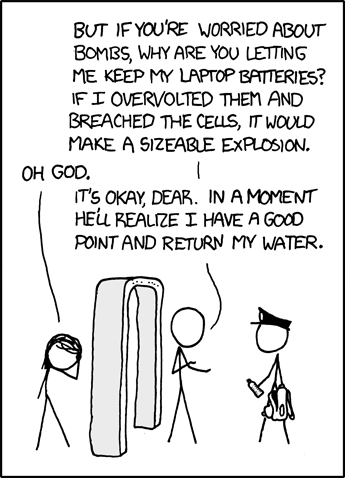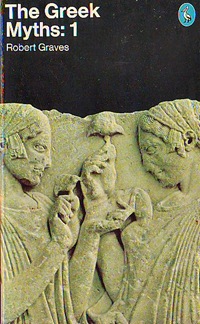Its been said before and it needs to be said again and again and again. But few will say it better than XKCD

Its been said before and it needs to be said again and again and again. But few will say it better than XKCD

When David Bollier was going on to the stage to give a presentation on the commons he noticed…
As I got up to speak, I paused and gulped: there in the audience was the pioneering scholar of the commons, Elinor Ostrom.
Talk about pressure! But all’s well that ends well:
I finished my presentation, and later saw Professor Ostrom ten yards away, down the hallway of the church. She flashed me a big smile and a “thumbs up.” What a relief! Two days later, I learned that she had won the Nobel Prize for Economics.
Read the whole story on On The Commons blog.
In 2007 Scandic Hotels decided that it will no longer be carrying bibles in their guestrooms (via Hotelchatter & Sydsvenskan) but after “massive” protests the bibles were replaced. Now the hotel chain Ibis has decided to remove the bibles since they are offensive to others (Dagen).
I would rather have free wifi than a bible but I guess there will be “massive” protests. The problem with massive in this scenario is that the majority couldn’t give a damn while the minority is the loudest…
Seriously even if you are a believer, even if you are a believer in any form of the new testament – what does it matter if there is no bible in the hotelroom? Why are believers in a loving god so intolerant of the rest of us? If they are right then we go to hell – so what? we don’t believe in it…
If it is your favorite book then carry your own! Everyone else has to.
An interesting site collecting and displaying flight plans is up and runningm the site OpenFlights is a site for “flight logging, mapping, stats and sharing”. They have also decided to release their data under the Open Database License (ODbL):
One of OpenFlights‘ most popular features is our dynamic airport and airline route mapping, and today, we’re proud to release the underlying data in an easy-to-use form, up to date for October 2009. Behold 56749 routes between 3310 airports on 669 airlines spanning the globe.
The data can be downloaded from our Data page and is free to use under the Open Database License.
Ever heard of Public Domain calculators? Well they have been part of by guilty conscience since May last year. The idea is to create a flowchart for calculating when works enter the public domain. And my guilty conscience? Well I still haven’t finished the Swedish version yet. I know, I know… Anyway the pressure is on again since there will be a Public Domain Calculator meeting organized by the Open Knowledge Foundation in Cambridge in November… High time to get to work, so where did I put my notes…

There is often a tendency to talk of ‘the public domain’ and of works falling out of copyright and ‘into the public domain’ – as though there is a single set of works which are out of copyright all over the world. In fact, of course, there are different national laws about the nature and duration of copyright in different types of works – and hence what is in the public domain is different in different countries.
We’re currently coordinating work to build a series of public domain calculators – which will help to determine whether or not a given work is in copyright in a given jurisdiction. At the time of writing we have been in touch with groups and individuals interested in helping to build the calculators in 17 jurisdictions.
In November, the Open Knowledge Foundation in association with the Centre for Intellectual Property and Information Law at the University of Cambridge are hosting a meeting of European experts on copyright and the digital public domain as part of the Communia project. The purpose of the workshop is to produce materials such as legal flow charts and public domain “algorithms” which will help with the representation of different national copyright laws and the determination of public domain status.
Details of the meeting are as follows:
- When: 10-11th November 2009
- Where: Emmanuel College, University Cambridge
- Wiki: http://wiki.okfn.org/PublicDomainCalculators/Meeting
Participate: Free but space is limited. If you are interested in coming, email the organizers at: info@okfn.org
The Olympic Committee has attempted to explain its actions in relation to the Creative Commons and the Richard Giles affair. This via Techdirt:
Last week, we wrote about the International Olympic Committee’s complaints concerning a guy, Richard Giles, who had posted some images he took at the Beijing Olympics on Flickr under a Creative Commons license. At the time, it wasn’t entirely clear if the complaint was the license or that the photos were up, at all, but as we noted, either way, it didn’t make sense. The IOC has responded and said the main complaint is with the Creative Commons license, but, again, it’s difficult to see how the IOC has any argument at all. The photos were taken by Giles, and thus he has every right to license them as he sees fit — including under CC licenses. Furthermore, as Thomas Hawk points out in the link above, once you license something CC, you can’t go back on it. It’s still not clear why the IOC sees this as a bad thing. Giles is helping to promote their event. For free. Next time, maybe he should just send them a bill.
Ryan Calo over at the Standford Center for Internet and Society (is this the new Berkman?) is asking some very interesting questions about the legal issues of web2.0
An Australian court rules that a mortgage company can issue notice of a lien over Facebook. A court in the UK permits an injunction to be served via Twitter. A woman is arrested in Tennessee for “poking” someone over Facebook in violation of a protective order. Meanwhile, a 1978 provision of the Bankruptcy Code still provides that notice shall “be published at least once a week for three successive weeks in at least one newspaper of general circulation.” New forms (and norms) of communication are both expanding and contracting the avenues for legally meaningful notice. Just how do we know, in this uncharted new landscape, when notice is enough?
In our joy of technology we must ensure that we do not forget to transfer the civil liberties developed over the course of our legal cultural history. To his list of examples I just want to add two more headlines New York man accused of using Twitter to direct protesters during G20 summit and Fraud Fugitive in Facebook Trap.
Also I want to mention the early work of Caroline Wilson who presented “Twit or Tweet? Legal Issues Associated with Twitter and other Micro-Blogging Sites” at GikII Amsterdam. (Jordan Hatcher’s liveblog of the event) for some additional questions.
Techdirt had an article that reminded me of an older discussion on the lecturers rights (copyright mainly) to their lectures. While on the face of it the question is easy. Of course lecturers have copyright in their own material. But the question becomes complex when discussing what lecturers with copyright should be allowed to do.
But, it appears that copyright maximalism is seeping into the classrooms as well. In the last couple of years, we’ve seen a lawsuit over a note taking service — claiming lectures are covered by copyright — and a professor demanding that students destroy all their notes at the end of the year since the professor claims he holds the copyright.
Michael Scott points us to a similar story, involving a Harvard grad who is running a non-profit notetaking service. While there’s no lawsuit or anything yet, there is a discussion on whether or not the professors’ lectures are covered by copyright
In April 2008 I wrote about Professor Michael Moulton who was using copyright to prevent students from selling their notes.
Standing and talking i.e. giving a lecture is not copyrightable per se, this is actually a good thing as most lectures tend to be the explanation of the works of many others (not all mentioned). A lecture on basic copyright law will include ideas and direct quotes from the law, courts and often other jurists. The nature of the lecture is to educate the audience on a certain issue and therefore cannot be only the ideas and opinions of the lecturer. This use of the ideas and texts of others is neither copyright infringement or plagiarism.
The lecture becomes copyrightable when it is a derivative work of the lecture notes. In other words a lecture given without notes is not copyrightable, nor is a lecture given from notes taken from the public domain. If the non-copyrightable lecture is filmed or recorded then the copyright goes to the person recording (the director).
The “right” of the lecturer to refuse the audience to record is actually not a question of copyright but more a question of labor law. For example, if I were to refuse to let my students record me the question would be one of my refusal to carry out my job as a lecturer. The ensuing discussion between my employer and me would be a re-negotiation of my contract to take into account the audiences’ desire to record my work. Many lecturers I have spoken to are not aware of this position and some react very strongly to being recorded while they work. The audience taking notes is a developed fair use but again the lecturer could theoretically refuse to talk if someone were holding a pen (as with a recording device) but it is doubtful that the academic employer would support this position.
I am now faced with an aesthetic dilemma – I have too many books and not enough will-power to stop buying more. The solution to the problem was to decrease the number of books I had so that I could keep up my addiction to dead trees. So first I used BookCrossing to release a bunch of books into the wild. Ten books, almost all in Swedish, but this was not enough
So now I am announcing a book givaway. I will send you any of the following books just tell me which you want in the comments below:

Collins & Makowsky (1998) The Discovery of Society (6th ed)

Robert Graves (1981) The Greek Myths vol 1 & 2

David Ariel (1988) The Mystic Quest

Wittgenstein (1961) Tractatus Logico-Philosophicus

John Allen Paulos (2000) I Think Therefore I Laugh

Sean Lang (1999) Parliamentary Reform 1785-1928

Stephen Gray (2001) The Artist is a Thief

Will Kymlicka (1995) Multicultural Citizenship

Hegel’s Political Writings (1998)

Mary Midgley (1991) Wisdom, Information & Wonder: What is knowledge for?

Giordano Bruno (1995) The Ash Wednesday Supper
There was a time when I had read most of the Nobel prize candidates (and therefore a few winners) before they were awarded the prize. But that seems like a long time ago. Slowly I fell out of touch with literature but until today I had not realized how serious my fall from literature had become.
That I had not read the latest prizewinner in literature Herta Müller did not overly upset me. I had after all been falling out of literature for some time.
But now that I heard that that the economics prizewinners were Elinor Ostrom and Oliver Williamson I was shocked. Not that they don’t deserve the prize – they really do. But what shocked me was that this is the first year I have books written by the economics winners in my bookshelf behind my desk (I have even cited their works) but I have never heard of the literature winner.
How sad.